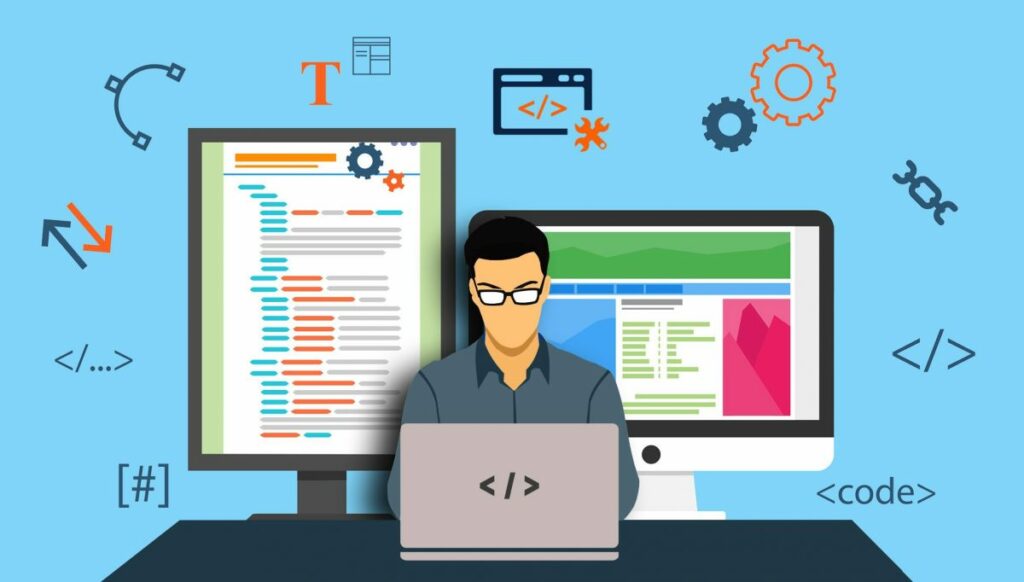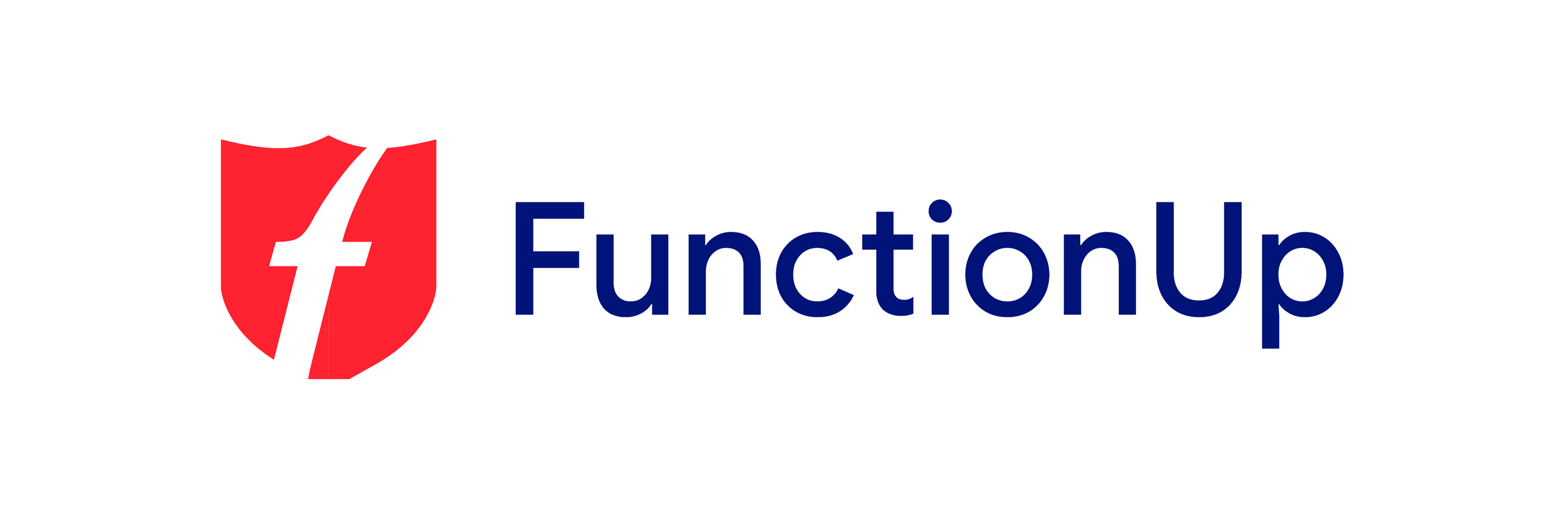
People of all backgrounds are attracted to technology as it offers numerous high-paying jobs. But given its rapid advancement, we should exercise caution not to become dependent upon obsolete practices and habits that have already become outdated.
Full stack development is one of those professions that will never go out of fashion, providing endless opportunities for career growth due to its wide array of responsibilities. This article delves deeper into what skills are necessary to become a full-stack developer; no certificate or skill will prevent anyone from becoming one, so read further if you would like an understanding of the top full-stack developer skills required for success!
Before discussing Full Stack Development skills in detail, let us first outline why becoming a Full Stack Developer might appeal here.
What Is Full Stack Web Development?
Any Web Development training requires knowledge of two forms of work: front-end and back-end development. Front-end developers oversee user experience design as it appears on an application’s user interface, while back-end developers power its server; creating code that permits data transmission between browser and database is part of this responsibility – together, these two areas make up what’s known as full stack development: a website or online app development project.
Who Is a Full Stack Developer? A full-stack developer understands all aspects of designing and creating online applications, from client-side development through server-side maintenance to user data storage databases. Their skill set encompasses understanding both client-side developments and server-side features of web development projects.
What Does a Full Stack Developer Do?
A full-stack developer is an experienced programmer capable of simultaneously working both the client and server sides of any program. Individuals identifying as full-stack developers possess in-depth knowledge in every facet of technology required for program creation. They possess complete mastery over each component as they function together and complete control of its underlying architecture.
Skills necessary for full-stack developers encompass many computer programming disciplines and require considerable experience to gain recognition as such in the industry. Established and emerging businesses value full-stack developers highly; taking full-stack web development classes or earning certification from respected organizations could increase both the weight of your CV and the chance of employment by companies of your choosing.
Now that we understand what full-stack developers do, let’s identify some essential skills necessary to do full stack development in 2023. Here is our full stack developer skills list below:
1. Choose Your Front-End Developer Stack
A full-stack developer’s essential skills involve selecting and customizing their Front-End Developer Stack. While back-end programming handles site architecture and logic in the background, front-end development specializes in aesthetic appearance and feel for client access – including communication between a program that develops it and clients via clients accessing front-end website pages themselves. HTML CSS Java Script are among the main technologies included as front-end developer skills by full stack developers – to understand front-end development fully, you must acquire knowledge in these technologies as they comprise part of Front End Development by full stack developers as they cover various facets of Front End development as part of their skill set as full stack developers need HTML CSS JavaScript Bootstrap technology among them all as these areas must learn HTML/CSS as well.
Git: Git is an important version control system to help track changes to codebases and collaborate on development teams with others. Full-stack developers should become acquainted with Git to effectively modify its contents when making necessary alterations in an efficient manner.Basic design skills: Understanding basic prototype and user interface design practices is vital to becoming an accomplished full-stack developer.
2. Strengthen Your Front-End Development Skills
Coding is one of the cornerstones of a full stack development skillset. Learning coding independently can significantly strengthen front-end development capabilities and confidence levels as you advance. Once confident, start small projects before progressing to larger ones as confidence allows. We suggest looking through popular Git repositories to get an understanding of how code is organized or what tools or libraries may be being utilized; start simply by using grunt plugins to minify JS files before expanding on them, or simply browsing any well-known website using HTML/CSS sources code directly – all ways and means!
3. Select Your Back End Developer Stack
Full stack development skills require proficiency in both technical skills for full-stack developers and front-end programming languages because their work involves both ends. Back-end tech stacks typically consist of programming languages, libraries, structures, servers, and data set administration frameworks which make up its main components; all this makes up a full stack developer stack:
Programming Languages: Java, PHP, and Python
Java: JavaScript is an extremely flexible programming language designed for building web apps quickly. Due to its popularity and ease of use, JVM script development skills can lead to numerous job opportunities in full stack development roles.
React: React is a JavaScript library for creating user interfaces, making full stack development skills in this area increasingly sought-after by employers. As it becomes an increasingly relevant skill set for full-stack developer positions, learning React could give your job application an edge over competitors.
Node.js: This platform for running JavaScript applications is popular among many companies, and having experience using it will increase your odds of snagging a job offer. Programming languages: They should excel in at least one server-side programming language like Java, Python, or Net for maximum employability.
Frameworks such as Laravel Django and Ruby on Rails will further boost this skill set.
Web Servers and API: Your chosen candidates should possess knowledge in Apache, Nginx, Linux, and Microsoft’s Internet Information Server (IIS) with strong exposure in MySQL, MongoDB, Redis Oracle SQLServer databases as well as handling them efficiently for data retrieval purposes, as Full Stack Developer Skills.
4. Strengthen Your Back End Development Skills
Back-end development is one of the key full stack development skills required; depending on which position you seek to fill, it is best practiced using one or more programming languages such as Java, PHP, Python, or Ruby for backend developer positions. Backend developers develop programs that link databases and applications together using communication channels created using programming techniques like these languages like programming. Practicing free internet-based tools regularly may strengthen your skill as a back-end developer over time.
5. Required Database Skills
A full stack development person writes the code needed for relational mapping – used to access data stored within databases – written by relational mappers like MySQL, SQL SERVER and PostgreSQL users, MongoDB, or Oracle Database users. DBMSs that enjoy widespread adoption include MySQL, PostgreSQL MongoDB, or Oracle Database, and they must possess strong database skills as part of a full stack development toolbox of skills. It is vitally important that developers master how databases operate – understanding them is imperative!
6. Required Server/Hosting Skills
Web hosting platforms enable full stack development people to publish their products to cloud service providers for online accessibility; server and hosting skills are integral to development. Popular examples are Microsoft Azure, Google Cloud Platform, and Amazon Web Services, which all need hosting experts who also possess knowledge regarding hosting. A full stack development person also needs knowledge regarding web hosting as this will affect development as a whole.
7. Select Your Full Stack Development Frameworks
Now that you understand many skills necessary for full stack development let’s focus on choosing frameworks. Full stack development people use frameworks to develop, upgrade and maintain websites and web applications – for those aspiring to becoming full-stack web developers alike, learning everything there is about full-stack technologies such as AngularJS, DjangoJs RubyNode as major frameworks can make all the difference when starting!
8. Expand Project Management Skills
Full-stack developers need excellent project management skills to complete tasks correctly and within schedules. As project management is an integral part of development life cycles, strategic project planning may make this stage less painful than anticipated.
9. Build Command in Version Control Skills
Version control provides systematic file and history management services like Git, Subversion, and GitHub to facilitate project file organization and keep an audit trail of user activity. Git specifically assists with project file organization, while Subversion keeps tabs on any work done by its user while keeping all related items’ history at your fingertips. GitHub offers users web-based Git version management with which you can review other people’s code to see errors or bugs and make suggestions to others or submit changes yourself.
10. Soft Skills
Being a full stack development person means managing various roles simultaneously and excelling not just at hard skills but also proficient with many of the associated soft ones; for this, the following list contains several soft skills which may come into play:
Communication, Multi-Tasking, Time Management, and Inquisitive Team Play are essential skills of a Full Stack Developer. Creative Mindset Attentive to Detail Attentiveness to Detail are some characteristics associated with full stack developers such as problem solver, good communicator, resourceful organizer, flexible lifelong learner, and team player positivity are traits to look out for as full stack developers are generally perceived to possess these personality traits as full stack developers have many of these personality traits associated with Full Stack Developer Personality Traits.
Should I Learn Frontend or Backend Development or Full Stack Development?
When learning how to code, one of the more frequently asked questions is which style they should focus on front-end development vs. backend development or full stack development. That decision depends on your intended goal for learning to code.
If you want to build websites or design user interfaces, front-end development skills will be handy. They include designing the look and feel of websites and handling user interactions.
Mastering backend development skills should be your focus if you want to create web applications or dynamic websites. Backend techniques involve developing the functionality of websites – for instance, retrieving data from databases or sending emails – while frontend and backend development offer great potential as foundational skillsets, helping you develop remarkable sites or applications!
Learn These Skills To Kick-Start Your Career
If you are looking to get advanced practical learning of Full Stack technologies and perhaps make a career out of it, FunctionUp‘s Program in Full Stack Web Development will give you in-depth knowledge of full-stack development. This course on full-stack web development covers front-end, middleware, and back-end Java technologies; through it, you will also learn to develop applications from start to finish while testing code using MongoDB storage and more!
Feel free to contact one of our experts and take the first step toward your dream career.
Do you know how much does a full stack developer makes? Read the whole blog here
